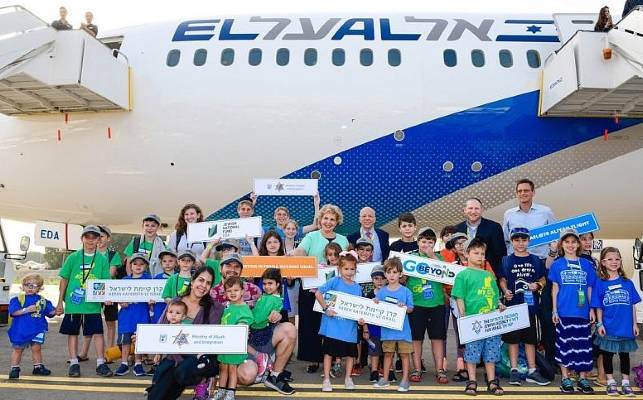The Aliyah Ministry on Wednesday launched a plan aimed at facilitating their integration.
By Etgar Lefkovits, JNS
Israel expects a wave of immigration in the wake of the war against Hamas, fueled by solidarity with the Jewish state and antisemitism rising worldwide, the minister of aliyah and integration said on Wednesday.
Some 6,500 people have immigrated to Israel since the Oct. 7 massacre, and there has been a significant increase in aliyah applicants from Western countries, including France, Canada the United States and the United Kingdom.
“There are those who sought to uproot us from our land and they will see aliyah,” Minister of Aliyah and Integration Ofir Sofer told JNS in an interview. “At the end of the day, Israel is the national homeland of the Jewish people.”
The minister opined that a nearly unprecedented feeling of solidarity with the State of Israel since the start of the war, which has seen Israelis more united than they have been for decades, was an even greater impetus than antisemitism abroad for the wave of immigration.
“The new immigrants see the togetherness and a common destiny,” Sofer said. “This immense solidarity is something that we have to maintain and strengthen for the future generations.”
An 180-degree change
After a year of intense polarization in Israeli society over the government’s judicial reform program, the surprise Hamas attack united Israel and the Jewish people worldwide in ways not seen since earlier wars more than half a century ago, he said, including the 1967 Six-Day War, which also saw a post-war burst of aliyah.
“This solidarity is a significant part of our victory for a stronger unified Israel,” Sofer said.
(Days before the Hamas massacre, Sofer called for “a year of national solidarity.”)
“It is our solemn duty to strengthen this after this difficult and challenging period. This is the absolute minimum we can do after what has happened here,” he told JNS on Wednesday.
‘From the difficulties, we can grow’
Since the start of the war, there has been a 300% increase in aliyah applications from France, a 150% jump from Canada, a 100% rise from the United States and a 40% increase from the United Kingdom.
Among the more than 6,000 new immigrants, or olim, since the outbreak of the war are youths who came to serve in the IDF, and parents of slain soldiers.
The Aliyah Ministry on Wednesday launched a plan aimed at facilitating their integration. The 170 million shekel ($46.4 million) project—pointedly being dubbed “Nevertheless” and carried out with the Finance Ministry—will offer additional support for immigrant housing, especially in the Negev and the Galilee, as well as university stipends and the opportunity to study in Hebrew for their first year.
“There is a lot of ‘home’ in the plan,” Sofer said.
The wave of immigration offers Israel an opportunity to build on the solidarity and spirit of volunteerism in the country, he said.
“From the difficulties, we can either grow or heaven forfend go backward,” he added.
“The Jerusalem we can build is one of solidarity,” the minister said. “If we build on such solidarity, then this war will be a game-changer.”
